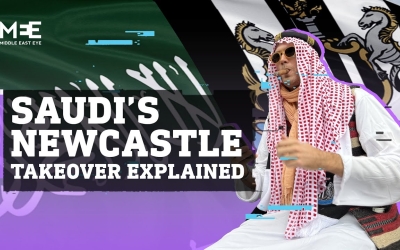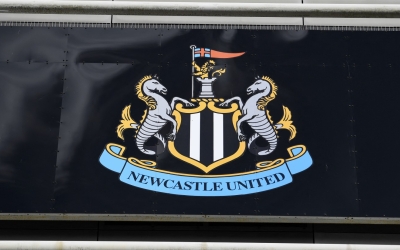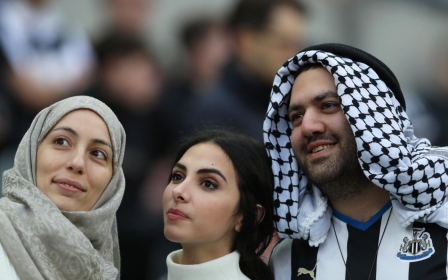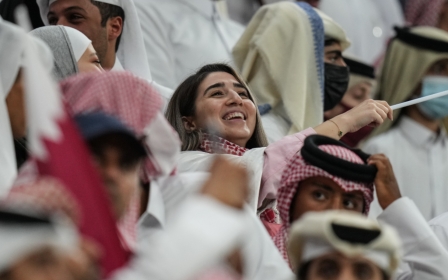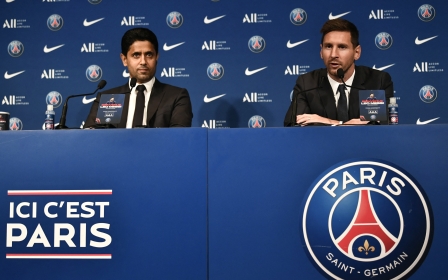Newcastle United: A year on, fans' opposition to Saudi takeover gathers pace
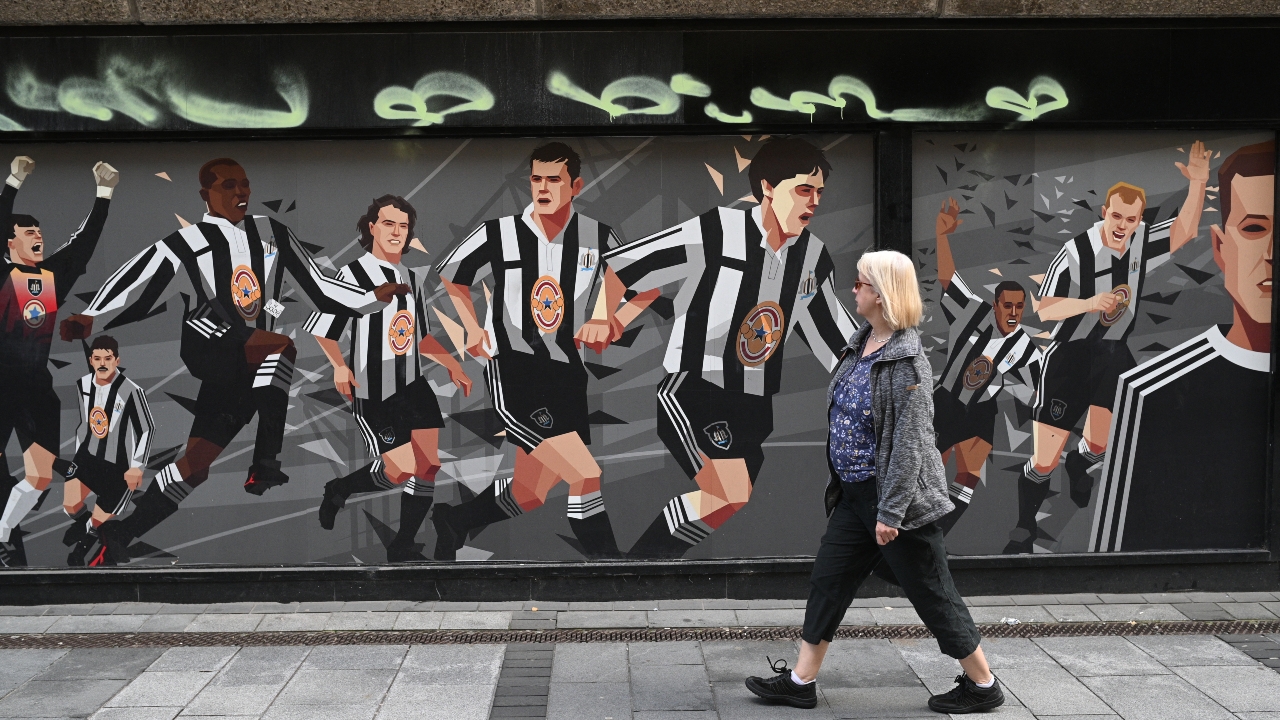
Twelve months ago, a Saudi Arabia-led takeover made Newcastle United the world’s richest football club overnight.
It sparked jubilant scenes - but not every fan was celebrating.
“I thought ‘Please no!’ I was happy to see Mike Ashley go, but I wasn’t in favour of a state - a dictatorship - taking over,” John Hird, an English teacher from Felling, a small town five miles from Newcastle, told Middle East Eye.
Ashley, a British retail billionaire, was accused of a lack of interest and investment during his 14-year ownership of the club.
'When the Saudi state owns 80 percent of your club it’s just a whole different category of problem'
- Daniel, Newcastle fan
“He took any ambition out of Newcastle, took the life out of the club. You take life out of the city as well if you do that,” says Daniel, a 32-year-old lifelong fan currently based in Leeds.
“There were a lot of ethical reasons to dislike Ashley as well,” he adds, pointing to poor working conditions at Ashley’s Sports Direct retail chain.
“But when the Saudi state owns 80 percent of your club it’s just a whole different category of problem.”
On 7 October last year, a consortium led by Saudi Arabia’s Public Investment Fund (PIF) - which manages over $600bn in assets - completed a buyout of the northeast England club.
The PIF is chaired by de-facto Saudi ruler Crown Prince Mohammed bin Salman, and six of its eight other board members are Saudi government ministers.
The newfound riches propelled Newcastle United from relegation-threatened strugglers to a team rapidly rising up the Premier League table, with ambitions to qualify for European football.
Since the takeover, the club have held a training camp in the Saudi city of Jeddah, and released a kit in the same colours as the kingdom’s flag.
The close association with the Saudi state, accused of a wide range of human rights abuses, has made a section of the supporters uneasy.
Now, critical fans are becoming increasingly vocal and getting organised.
Opposition group emerges
“Some of the things the Saudi state is doing are heinous. Ethically indefensible,” says Daniel, pointing at abuses against LGBTQ+ people, and human rights defenders.
“As Newcastle fans, we should use the ownership of the club to turn the spotlight on things in Saudi Arabia they don't want to be seen. Make the ‘sportswashing’ ineffective.”
On that basis, Daniel set up a Twitter account, NUFC Against Sportswashing, to publicly counter what he saw as an attempt by the Saudi government to use Newcastle United to launder its international reputation.
Hird found Daniel on social media, and other dissenting voices began to emerge and make contact with each other virtually.
“It was the pandemic so it was difficult to meet," said Hird.
"We created a Whatsapp group, and eventually we had a Zoom meeting with about 25 people.
“We accept that we’re a minority of a minority. But you have to start somewhere. We’re at the stage of trying to win hearts and minds amongst the fan base.”
After connecting virtually, the group of fans got together to bring out a fanzine in August, titled "Hailstones in the Desert". The publication featured articles on homophobia in Saudi Arabia, the Saudi-led coalition’s involvement in the Yemen war, and how "sportswashing" works.
To complement the release of the magazine, the group held its first in-person meeting in late August, with around 20 in attendance.
The event included a talk from anti-war activist and former South African politician Andrew Feinstein, and a film screening about the situation in Yemen, which has been described as the world’s worst humanitarian crisis.
The war in Yemen is a particularly pertinent issue in the nearby town of South Shields, whose Yemeni and Arab community date back over a century. Members of the community previously told MEE they opposed the Saudi takeover.
“Feedback from the in-person meeting was really great. Some were already aware of the issues, but many who turned up were local residents or fans who were completely shocked by the stories from Yemen,” Daniel said.
Salma al-Shehab solidarity
One name discussed at the meeting was Salma al-Shehab, a Saudi student jailed for 34 years over tweets critical of the kingdom.
“My heart and hearts of all the people in our campaign go out to her. It’s absolutely brutal. Her criticisms of the government were very mild, and she should have every right to make them,” said Hird.
'If we truly want our club back, being used as a vehicle to improve a dictatorship won’t achieve it'
- John Hird, English teacher
Shehab, a PhD candidate at Leeds university, was at the time believed to have received the longest ever sentence given to a Saudi women’s rights defender.
“I live in Leeds at the minute, and I was shocked by the news,” he said. “What an unjust, brutal and misogynistic thing to do to a young mother.”
The same week of Shehab’s sentencing, Newcastle United announced that it had brought the women’s football club into its ownership for the first time - in an attempt to grow the women’s game. For Hird, there was an irony in the timing.
“Look at the hypocrisy,” he said.
“On the one hand, [Newcastle co-owner Amanda] Staveley talks about using the ownership to support women and girls. Yet she says nothing about Salma being in prison for 34 years.”
Hird adds that when he and other Newcastle fans tweet about Shehab’s case, they come under fire from anonymous Saudi social media accounts.
“I had a few tweets saying Salma was a terrorist. It’s disgusting. The campaign against us by Saudi accounts is very organised,” said Hird.
Daniel thinks that if enough fans raise a fuss about injustices at the hands of Riyadh, it may become intolerable for the club’s owners.
“I can dream of a time that whenever we talk about the club, we also talk about Salma al-Shehab, the Yemen war and all other human rights abuses," he said.
"Maybe if we keep doing that, it won’t be worth it for the Saudis to stick around in a few years.”
He says that to achieve this, he and other activists will continue speaking out on social media, connecting with human rights groups and holding meetings.
“Campaigns like ours remind people what football should be,” said Hird. “If we truly want our club back, being used as a vehicle to improve a dictatorship won’t achieve it.”
Middle East Eye propose une couverture et une analyse indépendantes et incomparables du Moyen-Orient, de l’Afrique du Nord et d’autres régions du monde. Pour en savoir plus sur la reprise de ce contenu et les frais qui s’appliquent, veuillez remplir ce formulaire [en anglais]. Pour en savoir plus sur MEE, cliquez ici [en anglais].


